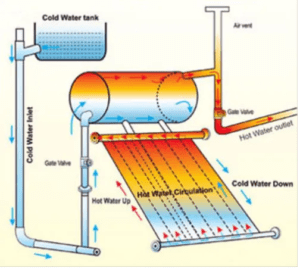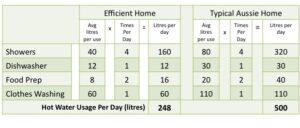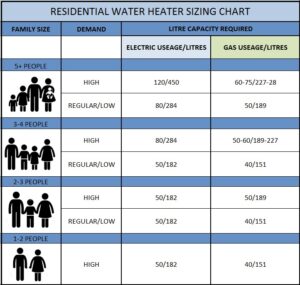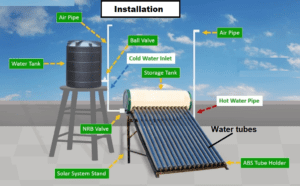How to Select a Solar Water Heater for Your Home?
What is Solar Water Heater?
- A solar water heater is a device that uses energy from the sun to heat water for household or industrial use
- It typically consists of a solar collector, a storage tank, and a heat exchanger
- The collector absorbs sunlight and converts it into heat, which is then transferred to the water in the storage tank through the heat exchanger
- Solar water heaters can be used for both domestic hot water and space heating
- They are an environmentally friendly and cost-effective way to heat water, as they rely on a renewable energy source and can significantly reduce energy cost

How does a Solar water heater work?
-
- A black absorbing surface (absorber) absorbs most of the solar radiation and is converted into heat energy
- This heat energy is absorbed by water inside tubes
- Heated water is collected in a tank which is insulated to prevent heat loss
- Solar water heaters work by using the energy from the sun to heat water in a storage tank
- The system is comprised of a solar collector, which absorbs the sun’s energy, and a storage tank, which holds the heated water
Life of solar heater:
- As solar water heaters last around 20 to 30 years, the last thing you want is to replace this investment soon.
- Much like any electronic system, solar hot water systems need servicing
- These systems need regular maintenance and servicing, to keep them in tip-top shape
Temperature Rise of solar water
- Under normal family use and summer solar conditions, the solar water heater should operate between 60ºC and 70ºC.
- However, the temperature can exceed this and under certain circumstances may be as high as 95ºC
Thermal Efficiency of Solar Heater
- Efficiency depends on the amount of solar radiation absorption with less heat loss to surrounding
- This can be done by forcing air to flow over the front glass cover (preheat the air) before passing through the absorber. The heater design needs an additional cover to form a counter-flow heat exchanger
- Porous media forms an extensive area for heat transfer, where the volumetric heat transfer coefficient can be high.
Types of Solar Water Heaters
There are two main types of solar water heaters: passive and active.
Passive solar water
- These solar heaters are the simplest and most affordable type of solar water heater
- They work by using natural circulation to transfer the heat from the solar collector to the storage tank
- This type of heater is ideal for homes in warm climates, as it does not require a pump to circulate the water.
Active solar water heaters
- Active solar water heaters use a pump to circulate water between the solar collector and the storage tank
- This type of heater is more efficient and can be used in a wider range of climates, but it is also more expensive

- Solar water heater diagram

- Water circulation of solar water heater

Benefits of Solar Water Heater
As we know that traditional electric or gas water heaters consume large amounts of energy, which contributes to greenhouse gas emissions and the degradation of the environment.
- This is a device that uses solar energy to heat water for various domestic purposes such as bathing, cleaning, and cooking
Eco-friendly and cost-effective:
- it is an alternative to traditional electric or gas water heaters and can help to reduce the amount of energy consumed in a household
- One of the main benefits of using a solar water heater is the cost savings it provides.
- Solar energy is a free and renewable resource, and using it to heat water can greatly reduce the amount of energy consumed in a household.
Government Subsidy on Solar Power
- Many governments ( Maharashtra Government in India) offer financial incentives for households that switch to solar water heaters, making the switch even more affordable.
- The scheme aimed to add solar and another renewable capacity of 30,800 MW by 2022. The total central financial support of Rs. 35,000 Crore including service charges to the implementing agencies.
- The subsidy helps to reduce the installation cost
- All solar systems work by absorbing the sun’s energy and using it to heat water in the storage tank
- The water is then stored in the tank until it is needed, and it is distributed to the various outlets in the home through a network of pipes.
- By using solar energy to heat water, households can reduce their carbon footprint and help to preserve the environment for future generations
How to Select the Capacity of Solar Water Heater
- To determine the capacity of a solar water heater in liters, you’ll need to consider your household’s daily hot water consumption and the local climate conditions. Here’s a basic method to help you calculate the required capacity:
Estimate Daily Hot Water Consumption:
- Start by estimating your household’s daily hot water consumption. This can vary based on the number of people in your household and their hot water usage habits. As a rough estimate:
- Small household (1-2 people): Around 30-50 liters per person
- Medium household (3-4 people): Around 25-35 liters per person
- Larger household (5+ people): Around 20-30 liters per person
- Multiply the estimated consumption per person by the number of people in your household to get the total estimated daily consumption.

- The solar water heater for the family is given below

- solar water heater 200 ltr is commonly used for small and medium family for 6-7 people with price of Rs 30,000 to 40,000 in India
Consider Temperature Rise
- The temperature rise is the difference between the incoming cold water temperature and the desired hot water temperature.
- In colder climates, you’ll need more energy to heat the water to the desired temperature.
- For a comfortable hot water temperature, you might consider around 40-50°C (104-122°F).
Account for Solar Insolation:
- Solar insolation refers to the amount of sunlight available in your region. The more sunlight you have, the more efficiently your solar water heater will work. If you live in a region with ample sunlight, you might require a smaller capacity system.
Calculate Required Storage Capacity:
- To calculate the required storage capacity of the solar water heater, use the following formula: Required Storage Capacity (liters) = (Estimated Daily Consumption) x (Temperature Rise) / (Solar Fraction)
- The solar fraction is the portion of the hot water demand that can be met by the solar water heater. It depends on factors like system efficiency, solar radiation, and hot water usage patterns.
- As a general guideline, a solar fraction of around 0.5 to 0.7 is commonly used.
- Remember that this is a simplified method, and actual calculations might vary based on specific system efficiencies, climate conditions, and other factors. It’s a good idea to consult with a professional solar water heater installer or manufacturer to get a more accurate assessment of your household’s requirements.
- Keep in mind that oversizing the system slightly can help ensure you have enough hot water, especially during cloudy days or times of increased demand.
Installation of Solar Water Heater
- Typically, domestic solar water heating systems are installed on the roof of the house
- The collectors of the system have to face the sun and hence should be oriented due south for maximum interception of sunlight
The angle of the water tube
- During the spring the best angle is 45°
- During the summer when the sun is high in the sky, it’s best to have a low tilt at 20°
Installation Steps for SWH:
- Fit the solar collectors on the roof.
- Mount the solar storage tank and heat exchanger next to the conventional water heater.
- Fit the piping and pump for the glycol loop.
- Fit the water piping.
- Install the control valves.
- Fill the system with water.
- Insulate thermally the water pipes and glycol lines.

Selection of Solar water
- Need for Solar Water Heating
- Homeowners must have enough storage to meet 90 to 100 percent of their hot water needs
- Water Heating capacity:
- Proper sizing is essential
- Sufficient water storage volume
- A 50- to 60-gallon storage tank is fine for up to three people, an 80-gallon tank for up to four people, and a larger one for as many as six people.
- Installation space:
- The solar thermal system occupies y less space than photovoltaic panels
- Some space is required to heat water than in an array used to produce sufficient power for a home.
- High efficiency:
- A solar water heater should have a high thermal efficiency
- About 80 percent of the sun’s radiation is turned into the heat energy needed to obtain hot water at home.
- Cost savings:
- The cost of two or three panels is cheaper than larger domestic installations.
- You save huge costs of fuel bills for supplying gas heating systems.
- Low maintenance cost:
- After installation, low maintenance is required, and a solar water heater can run easily for up to 15 to 20 years
- Lower carbon footprint:
- A home can be eco-friendlier, plus tax incentives may be available for using renewable energy.
Disadvantages of Solar Water Heaters
- Solar thermal panels can heat or less heat water than need
- Solar heaters need sufficient roof space for installation
- There must be direct sunlight
- The solar system does not work during seasons of cloudy, rainy, or foggy days
- Annual maintenance is recommended to check the pump and antifreeze
- Installation requires the use of a new hot water cylinder.
Is a solar water heater better than an electric one?
- With the one-time investment in the solar water heater, you will be saving money and energy for your entire life
- Therefore, investing in a solar water heater will be the best decision
- The solar water heater is more energy efficient than an electric water heater in many ways
- Electric heater consumes more electricity: around 100 Units for one person for bathing
- If solar hot water heaters provide hot water all throughout the year, then it reduces your electricity bills as it can provide a third of your hot water needs
- Solar water heater reduces your carbon footprint by saving between 30 kg and 510 kg of carbon dioxide (CO2) every year.
Conclusion
- A solar water heater is a cost-effective and eco-friendly alternative to traditional electric or gas water heaters
- By using the sun’s energy to heat water, households can save money on their energy bills and reduce their carbon footprint
- With the availability of financial incentives and the growing demand for environmentally-friendly products, now is a great time to switch to a solar water heater.
